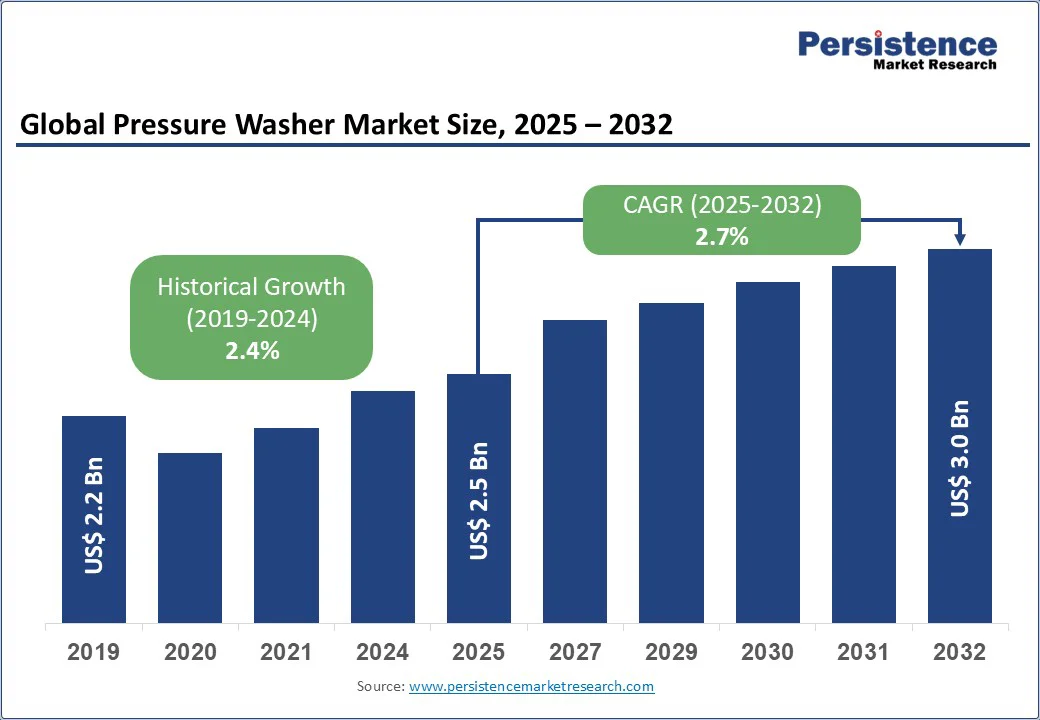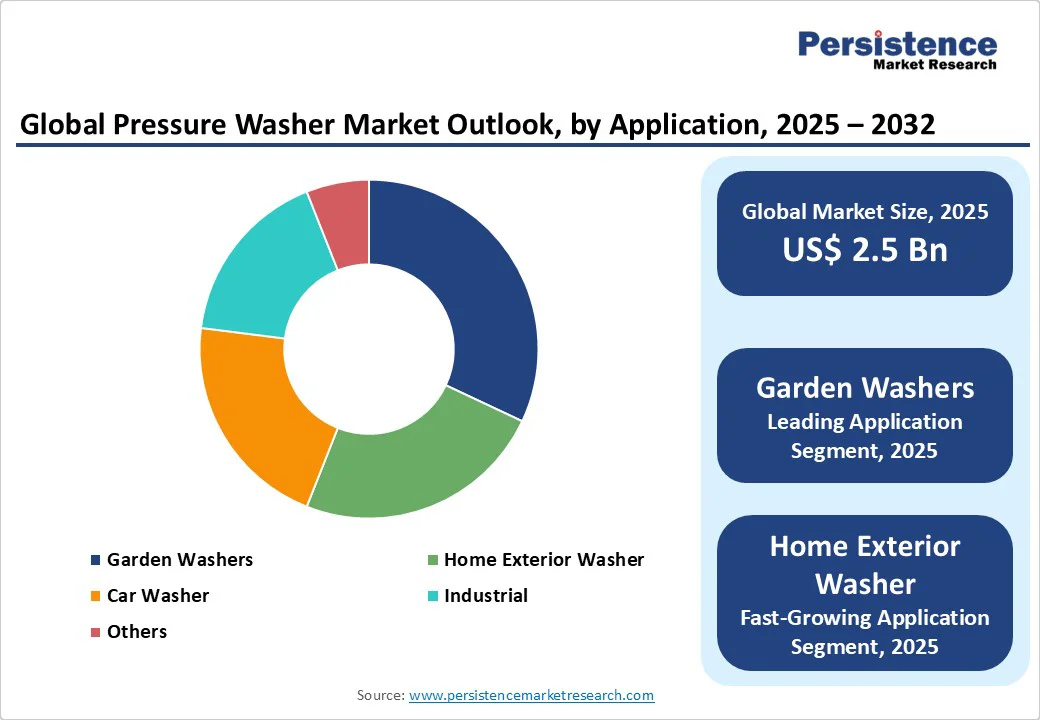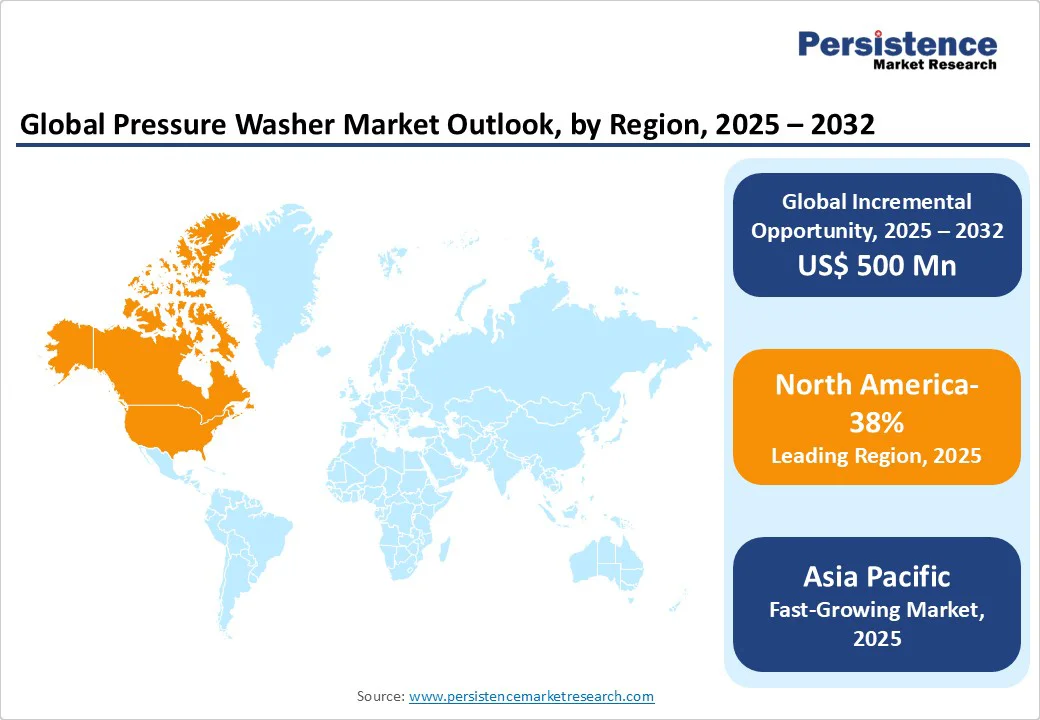ID: PMRREP11767| 198 Pages | 25 Sep 2025 | Format: PDF, Excel, PPT* | Industrial Automation

The global pressure washer market size is likely to be valued at US$2.5 bn in 2025 and is expected to reach US$3.0 bn by 2032, growing at a CAGR of 2.7% during the forecast period from 2025 to 2032. The major growth factor is the rising adoption of residential and commercial cleaning solutions driven by increasing homeownership, DIY maintenance trends, and the growing need for efficient outdoor cleaning.
| Key Insights | Details |
|---|---|
|
Pressure Washer Market Size (2025E) |
US$2.5 Bn |
|
Market Value Forecast (2032F) |
US$3.0 Bn |
|
Projected Growth (CAGR 2025 to 2032) |
2.7% |
|
Historical Market Growth (CAGR 2019 to 2024) |
2.4% |

The growth of the pressure washer market is strongly driven by rising vehicle ownership worldwide. With the rapid increase in personal car and two-wheeler ownership, households are looking for convenient and efficient cleaning solutions. For instance, government energy and transport studies project that India’s vehicle stock will more than double between 2023 and 2050, with two-wheelers forming nearly 70% of the total. This surge in automotive adoption directly translates into higher demand for residential pressure washers, as consumers increasingly prefer home-based vehicle cleaning to save costs and maintain appearance.
Alongside vehicle growth, home improvement trends have become a major catalyst. Government-backed affordable housing programs and reforms in urban development have led to a significant rise in completed homes and renovations. With more households investing in property upgrades, demand for equipment that supports outdoor cleaning—such as washing facades, patios, and driveways—has expanded rapidly. Pressure washers are now seen as essential tools for modern homeowners balancing convenience, efficiency, and hygiene.
A key restraint is the high upfront investment required for advanced models. Heavy-duty and commercial-grade machines come with significant purchase costs, which can be prohibitive for price-sensitive households and small businesses. Although these machines offer better performance and durability, the cost barrier often pushes consumers to rely on conventional cleaning methods or lower-capacity alternatives, limiting overall market expansion.
Noise regulations present another challenge, particularly in residential and urban settings. Gasoline-powered pressure washers are known to generate high noise levels, which has prompted authorities to impose strict operational limits. To comply, manufacturers must incorporate noise-control features and invest in quieter technologies, which increases production costs. These factors collectively impact product affordability and adoption, slowing wider market penetration.
Eco-friendly innovations are creating strong growth opportunities. Manufacturers are increasingly focusing on sustainable designs, such as electric and battery-powered models that consume less water and produce lower emissions compared to traditional gasoline units. Advancements in high-efficiency nozzles and smart pressure control systems further support eco-conscious cleaning, appealing to both households and commercial users who are prioritizing green solutions. This shift aligns with global sustainability goals and evolving consumer preferences for environmentally responsible products.
At the same time, emerging markets present significant expansion prospects. Rapid urbanization, rising disposable incomes, and growing vehicle ownership in regions such as the Asia Pacific, Latin America, and Africa are fueling demand for modern cleaning equipment. With governments promoting infrastructure growth and housing projects, the adoption of affordable and eco-friendly pressure washers is set to accelerate, creating new revenue streams for global manufacturers.
Electric pressure washers dominate the pressure washer market with nearly 40% share, primarily due to their affordability, low maintenance needs, and eco-friendly performance. These models are widely used in residential applications such as car washing, patio cleaning, and household maintenance, where quieter operation and ease of use are highly valued. Increasing consumer preference for sustainable cleaning solutions and supportive environmental regulations continue to drive demand for electric-based pressure washers in urban and semi-urban regions.
Fuel-powered pressure washers, however, are emerging as the fastest-growing segment. Their high power output and mobility make them ideal for heavy-duty applications across construction sites, agriculture, and industrial cleaning. With infrastructure development projects expanding and outdoor cleaning requirements rising globally, fuel-based pressure washers are expected to witness strong growth, contributing significantly to the market’s future expansion.
Garden washers lead in 2025 with a 32% share, reflecting their wide use in everyday outdoor cleaning. Homeowners increasingly rely on these washers for maintaining gardens, patios, fences, and furniture, as they provide a simple and effective solution for removing dirt and debris. The growing interest in gardening and outdoor spaces, along with rising home improvement activities, has supported their position as the dominant product category.
Home exterior washers, on the other hand, are recording the fastest growth. Their ability to clean walls, facades, rooftops, and driveways aligns with the rising focus on property upkeep and renovation. With households investing more in improving the appearance and value of their homes, demand for exterior cleaning solutions is expanding steadily.

North America is likely to dominate in 2025 with a 38% share, supported by strong adoption across residential, commercial, and industrial applications. High household usage for vehicle cleaning and home maintenance, coupled with growing demand from professional cleaning services and the well-established automotive sector, underpins this leadership. The region also benefits from widespread availability of advanced models, robust distribution channels, and a rising preference for eco-friendly electric washers. With increasing focus on home improvement and outdoor cleaning, North America is expected to maintain its leading position over the forecast period.
Europe accounts for a notable share of the pressure washer market, supported by high levels of vehicle ownership, strong residential adoption, and established commercial cleaning practices. Stringent environmental regulations across the region are encouraging a shift toward energy-efficient and water-saving models, while the growing trend of home renovation and exterior maintenance further drives demand. With rising consumer focus on sustainable cleaning solutions, Europe is expected to retain its solid position in the global market over the coming years.
Asia Pacific is projected to record the fastest CAGR driven by rapid urbanization, rising disposable incomes, and expanding vehicle ownership across countries such as China, India, and Southeast Asia. The growing focus on home improvement, coupled with infrastructure development and commercial cleaning demand, is further boosting adoption. Affordable electric models are gaining popularity among households, while fuel-powered units are increasingly used in construction, agriculture, and industrial sectors. With supportive government initiatives for housing and urban projects, the Asia Pacific is set to remain the most dynamic growth region in the forecast period.

The global pressure washer market is characterized by intense rivalry, with players focusing on innovation, product differentiation, and expansion into emerging markets. Companies are investing in eco-friendly technologies, such as electric and battery-powered models, to meet growing demand for sustainable solutions. Strategic initiatives, including mergers, acquisitions, and partnerships, are commonly adopted to strengthen distribution networks and global presence. Continuous R&D efforts aimed at improving efficiency, reducing noise, and enhancing user convenience further shape the market’s competitiveness.
The pressure washer market is projected to reach US$2.5 bn in 2025, driven by automotive and home cleaning demand.
Rising vehicle ownership, home improvement trends, and water conservation needs fuel market growth.
The pressure washer market will grow from US$2.5 bn in 2025 to US$3.0 bn by 2032, with a CAGR of 2.7%.
Eco-friendly innovations and emerging market expansion drive opportunities in residential and industrial cleaning.
Leading players include Revive Powerwashing Inc., Kärcher, Generac, AR North America, Simpson, DEWALT, Stanley Black & Decker, CRAFTSMAN, RYOBI, and Sun Joe.
| Report Attribute | Details |
|---|---|
|
Historical Data/Actuals |
2019 - 2024 |
|
Forecast Period |
2025 - 2032 |
|
Market Analysis |
Value: US$ Bn, Volume: As Applicable |
|
Geographical Coverage |
|
|
Segmental Coverage |
|
|
Competitive Analysis |
|
|
Report Highlights |
|
By Product Type
By Application
By Region
Delivery Timelines
For more information on this report and its delivery timelines please get in touch with our sales team.
About Author